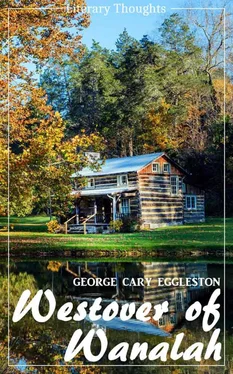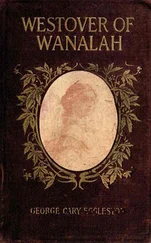With the reassurance of the solemn words Margaret had spoken the day before, Boyd Westover had no great fear of anything "Aunt Betsy" might say, but he was disposed to humor Colonel Conway, and besides he foresaw that life at The Oaks might be pleasanter for Margaret with the old lady's approval than without it. So the little diplomatic stratagem was carried out so successfully that Aunt Betsy—always chary in the bestowal of praise—said to Margaret that night:
"If you must marry,—and I suppose you must,—I'm glad you're to marry a young gentleman who observes the courtesies of life and knows how to treat his elders with proper respect. I rather approve of Mr. Boyd Westover."
"Thank you, Aunt Betsy," Margaret answered, concealing a smile. "You don't often say so much in praise of a young man."
"Of course not. In these days it's not easy to find young gentlemen who deserve any praise at all. Manners are so dreadfully lax nowadays. Even you shock and distress me frequently, in spite of the pains I've taken to train you properly."
"Why, Aunt Betsy, what have I been doing now? Is it something dreadful?"
"From my point of view it is. You spoke of Mr. Boyd Westover just now, by implication at least, as a 'young man.' A young lady doesn't associate with 'young men'; those whom she recognizes are young gentlemen."
"If you'd seen him encounter that bull and snatch me from under his horns, Aunt Betsy, I reckon you'd have thought him a good deal of a man."
"No—a good deal of a gentleman rather. The distinction is important, my dear, though I can't make you see it. And besides he's so polite to his elders, especially ladies. I was never more respectfully treated in my life. He's just like the young gentlemen of my time. Of course when he addressed you he sank upon his knees—"
"He certainly did nothing of the kind," Margaret answered hotly. "If he had I should have spurned him with contempt. No man who respects himself would bend his knee to any woman."
"I wish you would say 'gentleman' and 'lady'—and especially wouldn't call yourself a 'woman,' Margaret. It's positively shocking. But it's so with everybody in these degenerate days—even well-bred young girls, and Heaven is my witness that I've tried hard, to raise you well. When did he address you the first time?"
"There was only this one time," Margaret answered, dreamily, as she recalled the scene on the porch.
"Do you mean, Margaret, that you accepted him the first time he asked you?"
"Yes, Aunt Betsy, why not? I loved him."
"Margaret, you shock me; worse than that, your conduct grieves and afflicts me. Haven't I told you a thousand times that no lady ever forgets her dignity so far as that?"
"I haven't counted the times, Aunt Betsy, but probably your estimate of a thousand isn't far wrong. It is more than five hundred at any rate."
"Margaret, you trifle, and I'm not accustomed to be trifled with."
"I beg your pardon, Aunt Betsy. I didn't mean to trifle. Listen to me seriously now. I hold the love of a man and a woman to be the holiest thing on earth. I regard all trifling with it as blasphemy, and I think all your rules and conventionalities concerning it silly and sinful nonsense. If there is ever a time when a woman should be honest and truthful it is when the man she loves tells her of his love and asks for hers in return. There, I have shocked you dreadfully, I know, but you forced me to do it. I have spoken the truth as my soul sees it."
Without another word the high-strung girl quitted the room. It was the first time in her life that she had "broken bounds" with her aunt, and her self-assertion astonished even herself. But she did not and would not repent of it. Love had brought to her a new dignity of womanhood, that was all.
During the week that followed Boyd Westover found himself a busier man than he had ever been before. He was up at dawn to set going the day's work in the crops, and not long after sunrise he was apt to appear at The Oaks where Margaret awaited his coming for their early morning ride. After breakfast with her he returned to his fields, but by four o'clock he was at The Oaks again for dinner. His evenings were spent in his own chamber, where he toiled over papers until far into the night, in an effort to master every detail of the financial condition of the Wanalah estate.
When he had done so, he asked for a conference with Colonel Conway, to whom he explained his plans.
"I find that the interest charged on nearly all the notes my father gave is higher than it ought to be; on some it is positively extortionate. My father was an optimist, I suppose, and he seems to have fallen among thieves—money lenders, I should say."
"One and the same thing," said the elder man. "I know their kind. I'm myself a victim. Go on."
"Well, as I figure it out, the excessive interest the estate is paying—I mean the amount of interest in excess of a reasonable rate—eats up about half the tobacco crop every year, and I've decided to stop it, just as we stop the depredations of the worms and grasshoppers."
"Good! But how?"
"Why, I'm going to Richmond, and perhaps to the North if necessary, to find some one who will take a single mortgage loan for the whole amount of the estate's debts, a loan carrying a reasonable rate of interest. With the proceeds I'll cancel all the present debts, and thereafter the estate will have but one creditor, pay a moderate interest and devote every dollar of surplus earnings to a steady reduction of the principal. I've figured the whole thing out, and with ordinarily fair crops and a reasonable style of living, I can extinguish the entire debt in ten years or less."
The two went together over the figures, and the older man, who was both shrewd and experienced, pronounced the plan entirely sound and feasible. It remained only to find the bank, insurance company, or other financial institution that would make the loan.
In search of that, Boyd Westover set off almost at once for Richmond. As he rode away after parting with Margaret he turned in his saddle and gaily waved her a last adieu, quite as if the parting were expected to be for months or years instead of for the brief tale of days the youth assigned to it.
CHAPTER V – PLEASANT DREAMS AND AN UGLY AWAKENING
Boyd Westover sat in his hotel room about nine o'clock in the evening. Papers, mostly memoranda, lay scattered about upon his table, while some large sheets were spread out before him. On these he was making calculations.
He was a thorough-going person by nature and habit, and he was making careful estimates of the several offers he had secured for the making of the desired loan on Wanalah plantation, in an effort to determine which of them he might most wisely accept.
Finally he said to himself:
"The Milhauser offer is the best, or will be if I can persuade the agent to accept a mortgage instead of the deed of trust he wants. Perhaps I can. He didn't make the condition peremptory, and he clearly wants to secure the loan as an investment. I'll see him in the morning. No, by the way, he said I'd find him at home this evening if I should want to see him. I'll walk out to his house now."
Turning to the table he took up one of the memorandum sheets and read at top the number of the agent's house in far upper Broad Street.
"It's almost out of town," he muttered. "Must be out beyond Richmond College. But the walk will do me good, and I'll sleep better if I can get the thing settled to-night."
He put an extinguisher over the camphene lamp, and set out without overcoat or wrap of any kind. It was a warm, cloudy summer night, and the Virginians rarely wore overcoats even in winter. They were horsemen, all of them, and even the lightest overcoat is a burden and a nuisance to one riding on horseback.
Читать дальше












